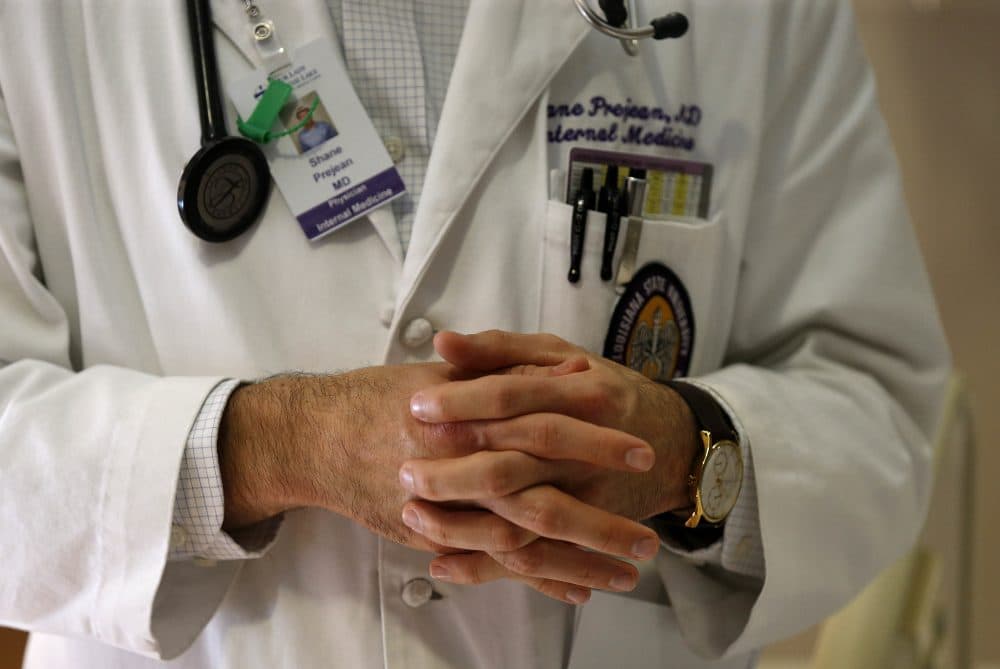Advertisement
Commentary
Caring For Undocumented Patients Is Even Harder In The Trump Era

“¡Queremos ayudarle!” I shout. I’m trying to reassure my restless patient in the medical intensive care unit that we want to help.
Nurses tie his flailing arms and legs to the bed rails. He is only several hours from his last drink, meaning worse agitation is to come as his alcohol withdrawal progresses. The nurses strategize out loud, but the English that fills the room is incomprehensible to him.
Within minutes, security guards arrive. The patient's eyes bulge when he sees their dark blue uniforms and the intercoms strapped to their shoulders. This, I realize, could easily seem like his worst nightmare: checking himself into the emergency room, only to be deported back to Mexico.
Our inattention to this patient's immigration status shames me into the corner of his room, as I think of the many hurdles he and other undocumented immigrants overcame just to be at the hospital.
This, I realize, could easily seem like his worst nightmare: checking himself into the emergency room, only to be deported back to Mexico.
The fastest evolving of these hurdles is the fear resulting from strengthened deportation laws, including President Trump’s executive order in January. Among its stipulations, the order mandated the hiring of 5,000 additional border patrol agents and expanded criteria for expedited removal of undocumented immigrants. Studies of similar policies in states like California and Arizona have shown that fear of deportation is linked to decreased utilization of medical care.
Undocumented immigrants’ fear of seeking medical attention is not simply a moral dilemma for doctors, who have sworn by the Hippocratic Oath to take care of patients anywhere. It’s an issue of concern to all Americans. If undocumented immigrants were to stop seeking preventive care at public and nonprofit clinics out of fear of deportation, the financial toll on taxpayers could escalate. Already, the annual cost of health care for the nation’s 11 million undocumented immigrants is $4.3 billion. Most of this expenditure comes from frequent emergency room visits, where complications from chronic disease that has been left untreated occur.
Another major hurdle is the lack of health insurance. Forty-two percent of undocumented adults have no health insurance, and half have no regular health care provider at all. And because of an unfamiliarity with how medicine is practiced, the hospital experience easily can be defined by uncertainty and fear about what will happen next.
When my patient was initially admitted to the hospital, that fear made obtaining information I needed from him a challenge. I tried asking him the routine questions that help guide treatment. But his responses were limited.
“¿Dónde vive?” I’d inquired. He said he lived somewhere nearby.
“¿Cómo llegó al hospital?” Friends brought him here. But he would not tell me exactly who or the best way to contact them.
“¿Tiene familia aquí?” No. All his family lives in Mexico.
I explained that nothing he said here could be legally used against him. Medical centers have long been considered a sanctuary from immigration enforcement. Along with schools and places of worship, they are what the Department of Homeland Security calls "sensitive locations," places where deportation enforcement should generally be avoided.
This brief explanation appeared to put him at ease. He opened up and provided me with phone numbers of his family in Mexico. Hours later, when he was in the full throes of alcohol withdrawal — strapped to the hospital bed with security assistance and later even medically sedated — we used the information he shared to contact his sister and help her obtain an emergency visa to see him. Following intensive therapy for severe pancreatitis, he left the hospital in a stable condition after only a month.
If undocumented immigrants were to stop seeking preventive care at public and nonprofit clinics out of fear of deportation, the financial toll on taxpayers could escalate.
I often think back to his eyes bulging in fear and ask myself how we treated this patient differently because of his undocumented status.
Simply recognizing him as undocumented was a first step; his medical chart specified he had no insurance and the only identification he had was the Mexican passport in the pocket of jeans. These were subtle clues to guide the gentle tone of our discussion. Communicating in his preferred language, Spanish, informed him of what was happening at all times.
What engaged him the most, though, was the reminder of his protection against deportation within the hospital. Given the trajectory of changes in our national policy, that may not be possible in a year — or even a few months. Such a policy change would counteract the apolitical spirit of beneficence in medicine.
But at least for now, being mindful of undocumented immigrants conveys that we want to help, que queremos ayudarle.
